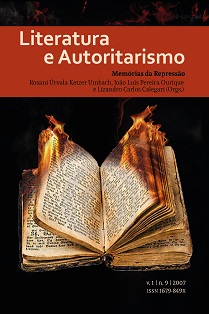Power and institutions in A casa de Bernarda Alba
DOI:
https://doi.org/10.5902/1679849X73985Keywords:
A casa de Bernarda Alba, Power, InstitutionsAbstract
Analyzed from the Foucauldian point of view, the last piece written by García Lorca allows us to state that the political power that the State and the Church demand in Spanish society offers Bernarda the necessary credential to reproduce in microcosm the despotism observed on a macroscale. For the daughter who dared to go beyond the imposed standards of behavior, death remains: punishment for those who, like the one who victimized the author of the play, are imputed to those who dare to disrupt the prevailing order.
Downloads
References
BROUÉ, P. A revolução espanhola (1931-1939). São Paulo: Perspectiva, 1992.
GARCÍA LORCA, F. Obras completas. Madri: Aguilar, 1972. .
GIBSON, I. Federico García Lorca. São Paulo: Globo, 1989. .
FOUCAULT, M. Microfísica do poder. São Paulo: Graal, 2004. .
MARTÍN, E. Federico García Lorca: Antología Comentada. Madri: Ediciones de la Torre, 1989.
Downloads
Published
How to Cite
Issue
Section
License
DECLARAÇÃO DE ORIGINALIDADE E EXCLUSIVIDADE E CESSÃO DE DIREITOS AUTORAIS
Declaro que o presente artigo é original e não foi submetido à publicação em qualquer outro periódico nacional ou internacional, quer seja em parte ou na íntegra. Declaro, ainda, que após publicado pela Literatura e Autoritarismo, ele jamais será submetido a outro periódico. Também tenho ciência que a submissão dos originais à Literatura e Autoritarismo implica transferência dos direitos autorais da publicação digital. A não observância desse compromisso submeterá o infrator a sanções e penas previstas na Lei de Proteção de Direitos Autorais (nº 9610, de 19/02/98).






